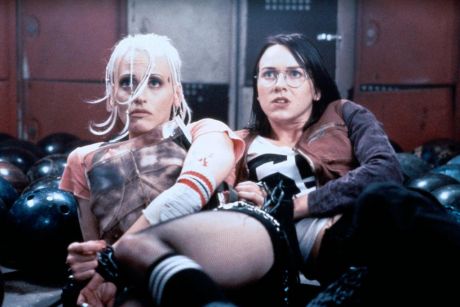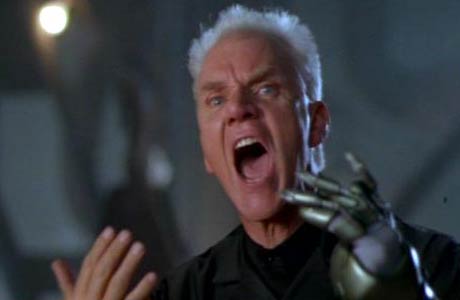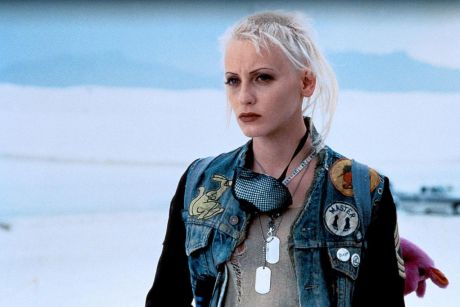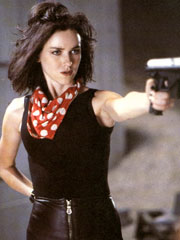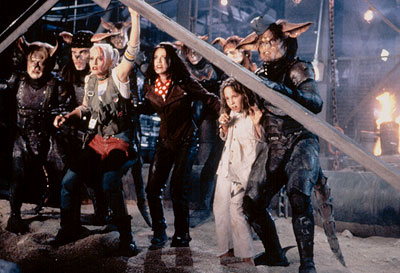From the Chicago Reader (April 7, 1995). — J.R.
Tank Girl
**
Directed by Rachel Talalay
Written by Tedi Sarafian
With Lori Petty, Malcolm McDowell, Naomi Watts, Ice-T, Don Harvey, Reg E. Cathey, Scott Coffey, Jeff Kober, Iggy Pop, and Ann Cusack.
I wasn’t exactly encouraged by the opening sequences of Tank Girl, a spin-off of a British comic book with a postapocalyptic setting. The movie starts with a kind of music-video visual dribble, set to the pounding strains of Devo’s “Girl U Want,” a song whose chanting refrain (“She’s just a girl — the girl you want”) seems to promise the kind of machocentric SF soft-core porn dished out by Barbarella 27 years ago. I’d been prepared for a steady influx of contemporary rock and rap and the concomitant collapse of any believable vision of the future, but this particular anthem seemed designed to cater only to guys. My expectations were raised, however, by the first appearance of Lori Petty, in the title role of Rebecca Buck — a hard-nosed renegade punk who clearly wouldn’t let herself be palmed off as a bimbo. But Kesslee, the movie’s arch-villain (played by the original movie punk, Malcolm McDowell), brought me back to the facetious S and M rhetoric of the glib and cutesy Barbarella. (Unlike the other characters, Kesslee doesn’t come from the Tank Girl comic book; he seems to have been pulled out of some archaic stockpile reeking of half- remembered James Bond films.)
The year is 2033, and a cosmic accident has made water the scarcest commodity around and reduced civilization to rubble. Kesslee, the evil head of the Water and Power Company, promptly shows how evil he is by smashing all his glass wall maps in a momentary rage, then ordering one of his stooges to walk barefoot over the shards. After insulting his minion for following his orders, he pierces the guy’s back with a gizmo that drains the water from his body into a glass, then gulps the liquid with relish. Here we go again, I thought.
But I was wrong. Despite such early show-offy gestures, Tank Girl is a lot fresher and funnier than its occasional shopworn heavy-metal features would lead you to expect. Though it doesn’t always prove equal to the challenges it sets itself — sometimes the continuity is klutzy, and not all of the high points are sustained — it provided me with more honest fun than any other teenage entertainment I’ve seen this year. And spit and polish have a lot more to do with that enjoyment than gobs of production values.
Indeed, the special effects that are supposedly so vital to the “art” of contemporary Hollywood movies have for some time actually prevented those movies from having much to do with art. Who would ever dream of making such claims for painting or music? What would we think of a music critic who tried to argue for the superiority of Philip Glass over Anton Webern on the basis of better sound-recording techniques? Yet one repeatedly hears that movies have “advanced” far beyond their primitive beginnings through their awesome use of technology — a pie-eyed reckoning that ranks equipment over expression and a materialist notion of content over any notion of style.
I have no idea what Tank Girl cost, but it looks and feels appealingly low-tech. When filmmakers don’t have a fortune to spend on fancy effects, there’s more opportunity for them to exert their ingenuity: for my money the artisanal details found in these sets and costumes are worth a lot more than the computer-generated effects of Jurassic Park and True Lies — movies that are too busy dumping high-priced goodies into our laps to worry about giving them personal touches. Tank Girl is silly enough to turn postapocalyptic punk into a fashion statement, but smart enough to do it with verve and style; it’s a workmanlike goof, but in personality and attitude it feels more up-to-date than any film loaded with expensive effects turned out by the big boys.
The director of Tank Girl is Rachel Talalay, whose first movie job was as a production assistant on John Waters’s Polyester and who produced Waters’s Hairspray and Cry-Baby. She also produced the second and third Nightmare on Elm Street sequels, Dream Warriors and The Dream Master, and her two previous features as director were Freddy’s Dead: The Final Nightmare and Ghost in the Machine. If you’re wondering what the Waters films and the Nightmare on Elm Street movies have in common, one might mention irreverence, a feeling for goofy detail, piecemeal shot-by-shot construction, and a taste for strong female characters. Spurred by a routine but serviceable script by Tedi Sarafian, Tank Girl displays these four qualities in abundance.
At its worst, the piecemeal construction guarantees awkward continuity, which means the waste of a few golden opportunities — such as a lavish production number built around Cole Porter’s “Let’s Do It,” staged in a fancy brothel known as Liquid Silver. But often the fragmented narrative is held together by the strength of the ideas and the performers. Periodically the movie switches from live action to rapid montages from the original comic book, some of which are animated, and it’s a tribute to the movie’s cohesiveness that it can accommodate such radical shifts in gear.
Petty has already made memorable appearances in Point Break, Cadillac Man, Free Willy, and A League of Their Own, and eventually she’ll be seen in a wonderful turn as a Jewish cop in LA in Charles Burnett’s The Glass Shield (presumably after he’s satisfied the folks at Miramax by diluting the anger of the original cut with a more upbeat ending). But Tank Girl signals Petty’s arrival as a punk heroine, and she’s more than equal to the part. Borrowing a page or two from Madonna but scaling down the narcissism, Petty conveys the sort of self-confidence that doesn’t require gimmicks or props, and the other actors get swept along by her energy — most notably Naomi Watts, an Australian-educated English actress familiar from Flirting and Wide Sargasso Sea, here playing Jet Girl, Rebecca’s comrade in arms.
In fact, despite the opening Devo song, Tank Girl is the least machocentric of the heavy-metal movies I can think of. Rebecca has a boyfriend at the beginning, but he gets wiped out by Water and Power before he really registers; she also has a biological or adopted daughter, who plays an important role in the plot. Indeed, Tank Girl and Jet Girl go looking for men only when they need some military backup for their assault against Kesslee’s forces, which occurs relatively late in the story.
What they find is a band of half-men/half-kangaroo mutants known as the Rippers (among them Ice-T and Jeff Kober), the film’s loveliest conceit and creations. Suggesting a cluster of furry 60s dopers, they speak in stoned raps and beat poetry; and without ever coming across as wimps, patriarchal or otherwise, they’re like Cowardly Lions (another possible reference to The Wizard of Oz is a scene in which one of the villains melts). If there’s ever a sequel, I hope the Rippers turn up in it more quickly; once they’re on duty to these sassy women, Tank Girl can do no wrong.

